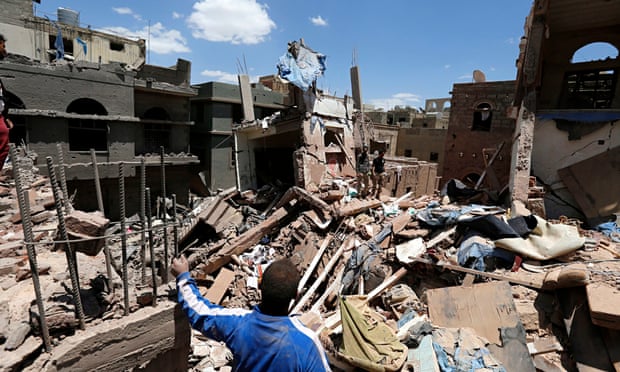While so much international attention is again focused on Syria because of the refugee crisis in Europe, another less noticed war, less commented on, yet equally vicious, especially for the civilians who bear its brunt, continues to tear at the Middle East. Yemen’s humanitarian catastrophe shows no sign of relenting. Yet it generates only a fraction of the attention focused on Syria.
The Yemen war is a conflict in which a Saudi-led coalition of Sunni Arab states has, since March, launched an all-out air campaign against the Iranian-backed Houthi armed groups who seized the capital Sana’a a year ago. Saudi Arabia’s stated objective is to roll back the Shia Houthis and reinstate Yemen’s president, Abdu Mansour Hadi, who fled last year as the insurgency gained ground. Saudi methods have been dismally indifferent to the plight of civilians. The indiscriminate targeting of populated areas has become routine. Bombs and shells have been fired at hospitals, schools, factories and refugee camps. The death toll has reached 4,500 in six months. According to the United Nations, 80% of Yemen’s 25 million population is on the brink of famine.
Nor are there signs of improvement. Indeed the indications are that things could soon get worse, as the Sunni coalition and Hadi loyalists are preparing a ground offensive on Sana’a. This is certain to be a disaster for a population that already faces food and medicine shortages, as well as drastic water cuts. Diplomatic efforts again falteredon Sunday when the possibility of peace talks, tentatively set for this week, suddenly collapsed after factions loyal to Mr Hadi announced they would not take part until the Houthi side recognised a UN resolution in support of the deposed leader.
Yemen’s history has always been marked by tribal and religious tensions, and the Houthi insurgency has been going on for some years. However, the heart of the current chaos and misery is the larger reality that Saudi Arabia and Iran have both made Yemen a testing ground for their regional strategic rivalry, against a backdrop in which the United States, the major supplier of arms to the Saudis, is simultaneously attempting a significant thaw in relations with Iran. All the Gulf states except Oman have joined the Sunni military coalition in recent months, yet the US has largely turned a blind eye to the war crimes being committed. Its priority is to allay Sunni fears that the old alliances could be compromised after the nuclear deal was reached with Iran.
Yet America’s balancing act may fail. The security vacuum created in Yemen, and the radicalisation that the conflict has accentuated, have opened up more space for al-Qaida-affiliated groups. Recent US drone strikes underline that what is happening in Yemen is military escalation, not stabilisation. A negotiated settlement is long overdue, but it will only happen if strong international pressure, including from the US, is exerted on the Saudis. If even more instability is to be prevented on the Arabian peninsula, there must be a preparedness to name, shame and restrain those who are conducting atrocities against civilians in Yemen. Current western complacency and silence will only bring more chaos and strife.

No comments:
Post a Comment